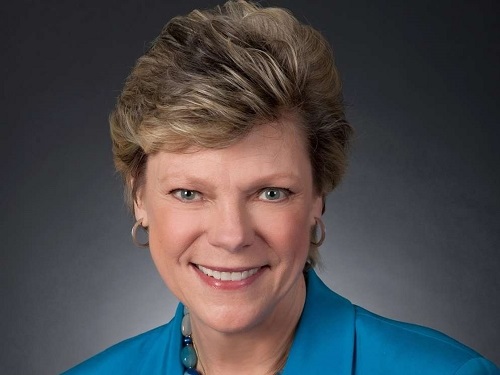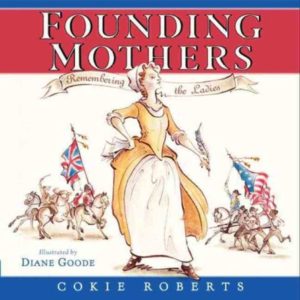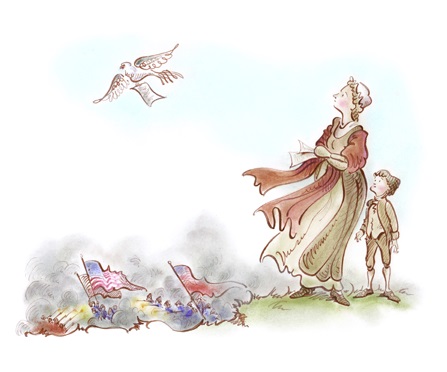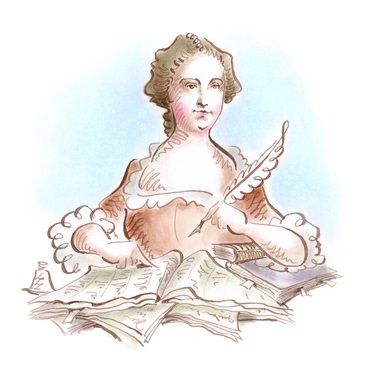
UPDATE 9/17/19: Legendary Journalist and Political Commentator Cokie Roberts Dies at 75. RIP.
By Stacey Gualandi/April 7, 2014
We have Cokie Roberts to thank for giving us a new understanding of the intrepid and fearless women of the American Revolution. This accomplished ABC News and NPR political commentator is now a children’s book author and has penned, Founding Mothers, Remembering the Ladies (@harperbooks).
“I think the women of the Revolutionary period would be flabbergasted that we have not come farther… It would equally amaze them that we have not had a woman president.” Cokie Roberts
This living legend, as deemed by the Library of Congress, has spent more than 40 years in broadcasting. She has many bestselling books under her belt, but with her new book, we and the kids discover the extraordinary triumphs of the women of the Revolution. Here’s an excerpt from my interview with Cokie recently on The Women’s Eye Radio Show…
STACEY: When I read this book, I felt like it was so refreshing to get a history lesson. It takes me right back to sixth grade when I played Martha Washington in the play 1776. But, I didn’t know any of this history about Martha!
 COKIE: Well, at least it was something. 1776 is a delightful play and it gives you some sense of Abigail Adams’ letters as well. Most kids don’t get that far, so you were ahead of the game.
COKIE: Well, at least it was something. 1776 is a delightful play and it gives you some sense of Abigail Adams’ letters as well. Most kids don’t get that far, so you were ahead of the game.
STACEY: I’m no kid, but I loved this book because there was so much history we didn’t learn. You wrote an adult book about the same thing. Is that lack of information why you wrote it?
COKIE: Absolutely. The ‘grown up book’, as I’ve come to call it, is also for that the reason. I didn’t know about these women. And, if I, who care so much about women and politics, didn’t know anything about them, I figured other people would be even more ignorant.
That turned out to be the case. I set out about the incredibly hard work of learning about them. It’s detective work. People have not kept or preserved properly the papers, letters or artifacts of these women.
STACEY: You profile Abigail Adams, Martha Washington, Dolley Madison, and others like Eliza Pinckley whom I have never heard of. How long did it take you to delve deeply into these women’s lives?
COKIE: Founding Mothers came out in 2004 and then the sequel, Ladies of Liberty, in 2008. So, I’d say, between the two of them, it was about 10 years. The children’s book was no where near as arduous in terms of time because I’d already done the research.
Pioneer Institute 3/14
The person who spent incredible amounts of time on the children’s book is the fabulous illustrator, Diane Goode, who has done an unbelievable job. She’s a Caldecott Medal winner and really gets into her subject wonderfully. The drawings are whimsical and funny.
STACEY: You’ve never written a children’s book before. Was it difficult to adapt to a younger audience?
COKIE: I spend a lot of time with kids. I have six grandkids who are in this age group. I have very good children’s book editors at Harper Books so that helped a lot. The truth is that being a broadcast journalist was the best preparation because I am used to having to make things very succinct and boil a whole of information down to very few words.
“What I found surprising was how deeply, deeply political these women were. First of all, our impressions are so different from that.”
STACEY: Whom were you most shocked to learn about in terms of their story?
COKIE: I don’t think there was anybody I was most shocked about. What I found surprising was how deeply, deeply political these women were. First of all, our impressions are so different from that. They were sitting at home tending to their duties. Secondly, it was so difficult for them to be this political.
Just getting through the day in the 18th century was no piece of cake. These women were raising children, taking care of old people and all of that. A disease could come through and take two of your children in a week.

With all of that, they, first of all, found the time and then the interest to be so deeply committed to the American cause. Abigail Adams at one point said, “We women are really better patriots than you men.” She said, “Here we are making all the sacrifices and suffering all the hardships for the cause, and if we win, you men are going to be held in high acclaim and hold office and we won’t even be able to vote. So we are better patriots than you are.”
STACEY: Didn’t John Adams kind of laugh at his wife?
COKIE: No. On that letter he agreed with her. She told him to remember the ladies when they formed a new code of laws, and he did in fact laugh at her.

STACEY: And thus the title of your book. I was most amazed by Deborah Franklin, who was married to Benjamin Franklin. For the majority of the marriage, he was in Europe, making her, actually, the Post Master General!
COKIE: Yes, that’s right! She really was. That’s one of the first things you learn in school, that Benjamin Franklin was the first Post Master General of the United States. But, he wasn’t here. He was in England. And, by the way, he was having a very nice time there. And, she was running the Postal Service and their businesses.
They had, essentially, a Kinkos. He thought she did a wonderful job. He would say, “Oh, you’re really good at this, Deborah.” That was fine; she could do all that, but she wanted him home. He was gone for years at a time.
Their only daughter got married and he still wouldn’t come because he wanted to keep the wedding cheap. He was a lobbyist for Pennsylvania and for the colonies in England. At one point his neighbors thought that he had been insufficiently opposed to the Stamp Act, that he had not taken a strong enough stand against the Stamp Act.
“They were ready to burn down his house. Everyone advised Deborah to leave. She said, ‘I’m not doing that.’ She got a gun. She got some relatives with guns, and they sent away the rowdies who were going to harm the house. Franklin was very pleased, saying, ‘Well done, Deborah!’
He still refused to come. Finally she died. He wrote to a friend that he had to go home, because “my wife, in whose hands I left the care of my affairs, has died.” He was not really a nice guy.
STACEY: As a journalist, I bet you were impressed by these women who had no social media, no computers, who were writing their letters and were very political in their writings.

COKIE: Yes. Diane got intrigued with their handwriting as well as the content that they wrote. Her husband found some antique nibs for quill pens. At the very last minute she said to me, “Do you think it would be possible to find all of their signatures?”
So I called around to the various universities, historical societies and libraries where the men’s papers are. Sure enough we came up with all ten of the women’s signatures. What is written under each of their pictures is indeed exactly how they signed their names.
STACEY: In terms of what you want to write about, are most of your subjects based in history?
COKIE: Absolutely. My husband is a journalist as well. He writes about living people. I write about dead people. Dead people don’t argue with you, which is really nice. I have always been interested in history.
As someone who has covered politics in Congress as long as I have, you spend a lot of time going back and reading what the Founders did about various topics like religion in the public square, the right to bear arms, things that come up all the time.
“I had grown up with political women in a political family and I knew how influential those women were. So I was curious about these women at that very important period in our history. So, that’s how I got started.”
STACEY: Do you think we have come a long way in the 250 plus years in terms of women? Where we are in terms of the political arena?
COKIE: Yes and no. I think the women of the Revolutionary period would be flabbergasted that we have not come further. If you woke them up and told them that women in America did not get the right to vote until 1920, they would say, “No way!” It was already on the table then. It would amaze them. It would equally amaze them that we have not had a woman president.
STACEY: In an interview, you had equated Hillary Clinton very closely in sisterhood with Abigail Adams. Do you think she’ll run?
COKIE: I don’t think she knows. I don’t know. I think everybody assumes so and I think that is a mistake.
Cokie Roberts Delivers LSU Commencement Speech 5/17/13
STACEY: Women like yourself were my inspiration to get into broadcasting. Do you think women are well represented now?
COKIE: I think there are now a good many women in broadcasting. A young woman can come into broadcasting and be accepted readily. It wasn’t true when I started out. They are moving up and into significant roles. Where you need to see more women is in the boardroom. That is something to change.
STACEY: It’s got to be frustrating for you who follows politics so closely that there isn’t a lot of parity.
COKIE: There certainly isn’t parity, but it’s a whole lot better than it ever was. Twenty percent of the Senate is better than the two women who were in the Senate as a maximum most of my life. It’s still not 53% though. The 20% makes a huge difference. The House has about 18%. So, it is considerably better. Is it good enough? No.
“…there are still some very fine journalists out there. The truth is more people have more access to information than ever before in human history.”
STACEY: What do you think about social media?
COKIE: I’m not into it but I think it’s fine. Let a thousand flowers bloom. The important thing is not to lose the core values, good reporting, good writing, and communication. Some of the blogging is vituperate and horrible. But there are still some very fine journalists out there. The truth is more people have more access to information than ever before in human history.
STACEY: Cokie Roberts, thank you so much. It has been such an honor to speak with you. How exciting to get this new knowledge! We’ll have to have you back for your Civil War book. In the meantime, we’ll keep spreading the word about the special women in Founding Mothers, Remembering the Ladies.
###



Leave a Reply